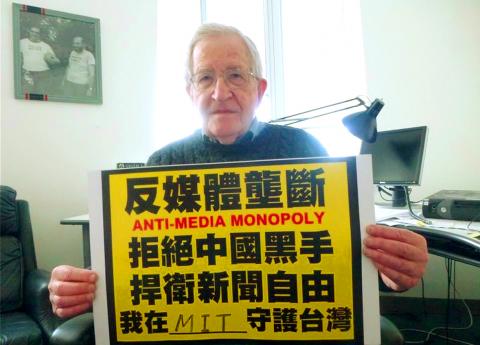Famed US linguist and activist Noam Chomsky lent support to Taiwan’s anti-media monopolization movement in a photograph shared on social networking site Facebook late on Saturday.
Chomsky, an 84-year-old linguistics professor at the Massachusetts Institute of Technology (MIT), was seen posing for a picture believed to be taken by a Taiwanese student abroad, while holding a poster that read: “Anti-Media Monopoly. Say no to China’s black hands, defend press freedom. I am safeguarding Taiwan here in MIT.”
The photograph was posted on Facebook at about 8pm on Saturday by a female netizen who identified herself as Lao Tzu-hung (劉子鳳), and had been shared about 4,000 times as of press time yesterday.

Photo: screen grab from Facebook page
Citing a famous quote by Chomsky, Lao said: “Propaganda is to a democracy what the bludgeon is to a totalitarian state.”
“When the media unanimously creates empty slogans such as ‘harmony’ or ‘stabilizing society’ and leave behind the real problems society should be facing, the public could easily lose their willingness and capability to think,” Lao quoted Chomsky as saying.
They could end up being the “onlookers” in democratic societies and fall for the delusion that “everything will be better tomorrow,” Lao quoted the celebrated linguist as saying.
Citing another quote by Chomsky to warn against the dangers of media concentration, Lao said that as long as people are marginalized and distracted they have no way to organize or articulate their sentiments, and they simply assume that they are the only people with what are seen as crazy ideas.
In the end, “you just stay on the side and don’t pay any attention to what’s going on. You look at something else, like the Superbowl,” Lao cited Chomsky as saying.
The photograph of Chomsky has prompted a fervent response among netizens, with some expressing gratitude to the famed scholar’s support for the country’s anti-media monopolization efforts.
An unidentified netizen said: “If a US scholar is aware of the dangers of media concentration [in Taiwan], the people of this country must not stay silent anymore.”
Dubbed as “the conscience of America,” Chomsky has strived to bring to light atrocities committed by the US government since the 1960s, including its support of the Indonesian regime’s brutal suppression of East Timor between 1975 and 1999.
Chomsky also emerged as a renowned public advocate for press freedom in the US and worldwide, mainly because of his vehement opposition to the notion of governments or giant corporations holding control over social media in which the public is manipulated.
Chomsky first visited Taiwan in August 2010, when he delivered speeches in Academia Sinica in Taipei and National Tsing Hua University in Hsinchu City.
A number of public figures in Taiwan have recently also expressed their opposition to media monopolization, including Wu Ching-feng (吳青峰), the lead singer of the popular band Sodagreen (蘇打綠).
Wu said during his New Year’s Eve performance in Greater Kaohsiung on Monday that the media should be an open platform through which the truth is conveyed, rather than something that attempts to monopolize the market or manipulate the public.

Right-wing political scientist Laura Fernandez on Sunday won Costa Rica’s presidential election by a landslide, after promising to crack down on rising violence linked to the cocaine trade. Fernandez’s nearest rival, economist Alvaro Ramos, conceded defeat as results showed the ruling party far exceeding the threshold of 40 percent needed to avoid a runoff. With 94 percent of polling stations counted, the political heir of outgoing Costa Rican President Rodrigo Chaves had captured 48.3 percent of the vote compared with Ramos’ 33.4 percent, the Supreme Electoral Tribunal said. As soon as the first results were announced, members of Fernandez’s Sovereign People’s Party

MORE RESPONSIBILITY: Draftees would be expected to fight alongside professional soldiers, likely requiring the transformation of some training brigades into combat units The armed forces are to start incorporating new conscripts into combined arms brigades this year to enhance combat readiness, the Executive Yuan’s latest policy report said. The new policy would affect Taiwanese men entering the military for their compulsory service, which was extended to one year under reforms by then-president Tsai Ing-wen (蔡英文) in 2022. The conscripts would be trained to operate machine guns, uncrewed aerial vehicles, anti-tank guided missile launchers and Stinger air defense systems, the report said, adding that the basic training would be lengthened to eight weeks. After basic training, conscripts would be sorted into infantry battalions that would take

GROWING AMBITIONS: The scale and tempo of the operations show that the Strait has become the core theater for China to expand its security interests, the report said Chinese military aircraft incursions around Taiwan have surged nearly 15-fold over the past five years, according to a report released yesterday by the Democratic Progressive Party’s (DPP) Department of China Affairs. Sorties in the Taiwan Strait were previously irregular, totaling 380 in 2020, but have since evolved into routine operations, the report showed. “This demonstrates that the Taiwan Strait has become both the starting point and testing ground for Beijing’s expansionist ambitions,” it said. Driven by military expansionism, China is systematically pursuing actions aimed at altering the regional “status quo,” the department said, adding that Taiwan represents the most critical link in China’s

EMERGING FIELDS: The Chinese president said that the two countries would explore cooperation in green technology, the digital economy and artificial intelligence Chinese President Xi Jinping (習近平) yesterday called for an “equal and orderly multipolar world” in the face of “unilateral bullying,” in an apparent jab at the US. Xi was speaking during talks in Beijing with Uruguayan President Yamandu Orsi, the first South American leader to visit China since US special forces captured then-Venezuelan president Nicolas Maduro last month — an operation that Beijing condemned as a violation of sovereignty. Orsi follows a slew of leaders to have visited China seeking to boost ties with the world’s second-largest economy to hedge against US President Donald Trump’s increasingly unpredictable administration. “The international situation is fraught